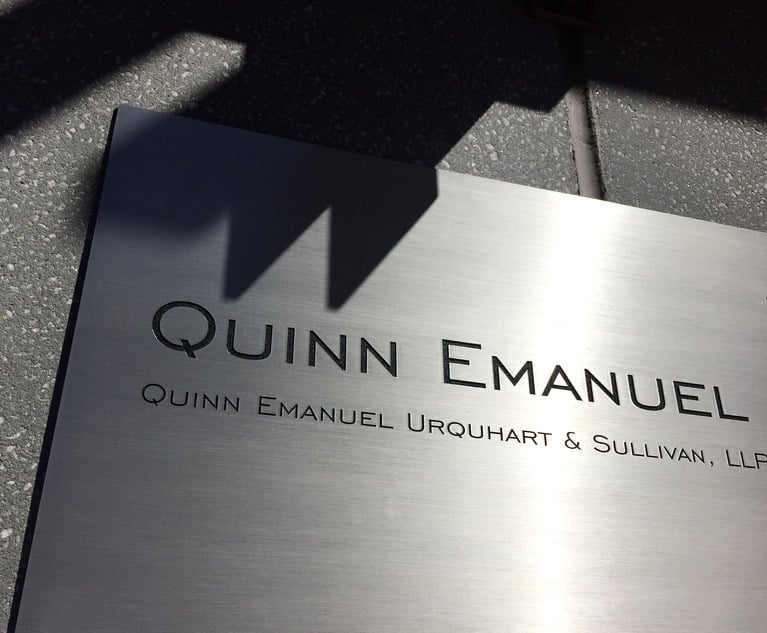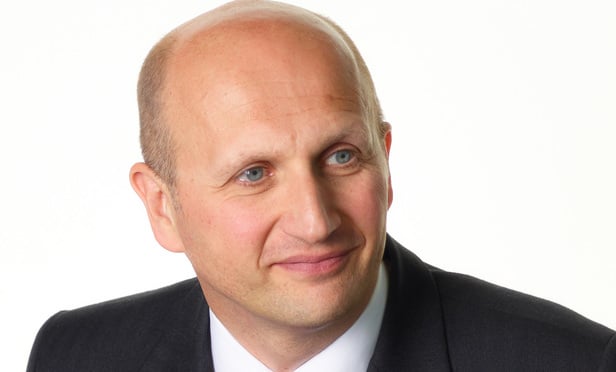Lloyd's of London GC Peter Spires on modernisation, Brexit and his favourite lawyers
General counsel of 'world's specialist insurance market' on why there's nothing quite like Lloyd's
November 27, 2016 at 05:01 PM
8 minute read
"We have stability," says Peter Spires, the new general counsel at Lloyd's of London. Having joining from Memery Crystal at the end of 1995, he has been there ever since.
"It's technically demanding because there isn't anything else quite like Lloyd's – you need to have the ability to be creative," he says. "We have the power to make our own rules. Our bylaw structure, our conduct rules, they've all been promulgated under our own statutory arrangements. It's interesting to write the rules for the market."
The self-proclaimed 'world's specialist insurance market' houses more than 90 syndicates, focusing on specialist markets such as energy, marine and political risk. It can trace its origins back to Lloyd's Coffee House, which opened in 1688 – six years before the Bank of England was established.
Lloyd's' latest half-year pre-tax profits were strong at £1.46bn, up 20% on last year. Notwithstanding these results, stability has become a scarce commodity in insurance, particularly given the continued uncertainty over Brexit. Continental Europe accounts for roughly 11% of gross premiums written by the London market. In response to estimates that 4% of its revenues may disappear post-Brexit – because of EU passporting rights being lost – Lloyd's is formulating contingency plans to ensure that it can continue to trade across Europe following the UK's eventual departure from the EU.
As confirmed last month by Lloyd's chief executive Inga Beale, this may include establishing a subsidiary or branches in mainland Europe. An EU-wide subsidiary would be a more cost-effective option, according to Beale. "We are now focusing our attention on having in place the plans that will ensure Lloyd's continues trading across Europe," says Spires.
Brexit apart, current market dynamics and a fast-changing regulatory environment present significant further challenges. "Moving Solvency II into a business as usual environment has been a huge amount of work," says Spires. "The market, the managing agents of Lloyd's and the Prudential Regulation Authority (PRA), are having to work out how to make that work best for everyone. At the same time, the PRA is very concerned about market conditions, making sure that underwriters are writing prudently. It's an interesting combination of events."
Lloyd's has done "an enormous amount" to meet the Financial Conduct Authority's (FCA) agenda, as Spires explains: "There hadn't been much focus on conduct issues in the Lloyd's market from the Financial Services Authority. Since 2014, we've ended up working very hard to roll out our own conduct standards for the market, to ensure that people understand exactly what the FCA expects from them in a subscription market."
His aim is "to get to a position where the FCA relies on the work that we conduct so that there isn't any duplication" by virtue of independent audits that they undertake. He describes the process as "really enjoyable", pointing to: "One line that said: 'would you sell this product to a member of your own family?' We realised that was too low a test and we had to change it to: 'would you sell it to a loved member of your family?'"
Spires adds: "Market conditions are very demanding for Lloyd's at the moment and for insurers generally. Meeting the prudential concern of protecting the market from the difficult market conditions is probably our number one priority."
He identifies those demanding conditions as an unusual combination of events caused by an unprecedented oversupply of capital and an absence of any major catastrophes. Rates and margins have been squeezed significantly. Spires is therefore understandably anxious that market participants don't move into "books of business that people aren't qualified to underwrite".
This, in turn, creates a further challenge: "Making sure that everyone has the capability to manage books of business that they may be tempted to move into in testing times. We don't want to see the mistakes of the 1990s repeated, when people didn't have the performance and capabilities to manage the books of business that they were underwriting."
Nevertheless, Spires' tone is one of measured reassurance, although he concedes: "Lloyd's is a complex place: technically complex, politically complex." To understand those complexities takes a long time, he adds, supporting the case for an increase in the size of his legal team, which is currently 21: "One of the difficulties we have is that you can't just recruit for a Lloyd's person, it takes up to 12 months before they fully appreciate the complexities of the place."
The team is split four ways: litigation, commercial, conduct, and franchising and regulatory relationship. Everyone works across different teams. Litigation is a primary focus: "Dealing with contentious proceedings against Lloyd's, a whole raft of internal appeals mechanisms, and an internal ombudsman scheme," he explains.
Lloyd's tries to keep "as much work in-house as we can; we pride ourselves on having the expertise to deal with most issues," says Spires. "We have a very rich training programme, which encourages people to spend time with law firms. We've had people seconded into us as well, most recently from Baker & McKenzie, which worked out very well."
But there is still much use of external specialist lawyers: Jon Lawrence, partner at Freshfields Bruckhaus Deringer, who is "very strong on the competition side"; Baker & McKenzie which is "excellent for HR work and international issues"; Simon Cooper, partner at Ince & Co, who is "excellent for his in-depth litigation insurance knowledge"; and "we see a lot of David Weir at Norton Rose Fulbright on M&A and market issues". But, says Spires, "the problem with some law firms is that you end up getting more and more people being tacked onto their teams".
For complex bespoke issues, he therefore often instructs counsel directly: "I really like the fact that you choose one person and you continue to get that one person." He points to the excellence of Robin Knowles QC, who "sadly for us became a judge", because he was "so prepared to give such clear and structured answers on things, which was fantastic. That is one of the key strengths of counsel." He adds that Lloyd's has had "some really good experiences" with litigation specialist David Alexander QC and Richard Fisher at South Square. "For the really big-ticket issues," they have instructed Lord Grabiner QC among others.
Of the remaining teams, commercial handles all the contracts undertaken by Lloyd's – "Increasingly important as we continue to move into the modernisation of our back office. There are a lot of contractual issues for Lloyd's and for the London market as a whole," Spires explains. The conduct team, meanwhile, has responsibility for policyholder complaints combined with a regulatory enforcement function. "We still discipline people within the market, probably three or four cases year," he says. These are invariably disciplinary cases against Lloyd's members and underwriting agents.
The franchise and regulatory relationship team is, he says "a rich smorgasbord of everything else": capital markets work; business planning arrangements; competition issues; managing the relationship with the PRA and the FCA; and acquiring and defending overseas licences.
Overseas expansion is "very much part of the commercial agenda and therefore the response comes from the legal regulatory clients' viewpoint to enable that to operate effectively", he explains. Beyond the recent announcement over potential new operations in Europe, Brazil and India are longstanding targets for Lloyd's expansion – part of Lloyd's' Strategic Vision 2025 to develop overseas licences.
Lloyd's was the first reinsurer authorised to operate in Brazil after the opening of the reinsurance market in April 2008. Following changes in legislation, Lloyd's is also seeking to establish a reinsurance branch in India.
"They are challenging markets in different ways," says Spires. "We've recently tried to work out how we might underwrite direct insurance in Brazil. It had a local regulatory regime that made that very difficult, really intellectually demanding."
There is no predictability in Spires' work: "Every day you think you're going to come in to deal with one thing, but you'll suddenly be dealing with the issue of the day; it's genuinely exciting and exhilarating." Located at the heart of events – one floor above the limits of the trading floor in the Lloyd's building – Spires spends much of his day "working with the market, meeting the managing agents, or meeting with the market associations". He adds: "It's great to be at the heart of it all."
"I get calls from people saying: 'what's your view on this?' or 'tell me what the answer is on that?' It's a lovely experience to be able to instantly point them in the right direction. I feel very proud of the institution, it's something that really gets into your blood. There's a real team spirit in the market as a whole and that crosses across from brokers, to underwriters, to members; it's a cohesive environment where people want to make things work."
This content has been archived. It is available through our partners, LexisNexis® and Bloomberg Law.
To view this content, please continue to their sites.
Not a Lexis Subscriber?
Subscribe Now
Not a Bloomberg Law Subscriber?
Subscribe Now
NOT FOR REPRINT
© 2025 ALM Global, LLC, All Rights Reserved. Request academic re-use from www.copyright.com. All other uses, submit a request to [email protected]. For more information visit Asset & Logo Licensing.
You Might Like
View All
X Ordered to Release Data by German Court Amid Election Interference Concerns

Quinn Emanuel's Hamburg Managing Partner and Four-Lawyer Team Jump to Willkie Farr

Trump ICC Sanctions Condemned as ‘Brazen Attack’ on International Law

U.S.- China Trade War: Lawyers Label WTO Dispute Pointless, Clients Have Their Hands Tied
Trending Stories
- 1Trump's DOJ Delays Releasing Jan. 6 FBI Agents List Under Consent Order
- 2Securities Report Says That 2024 Settlements Passed a Total of $5.2B
- 3'Intrusive' Parental Supervision Orders Are Illegal, NY Appeals Court Says
- 4Federal Laws Also Preempt State's Swipe Fee Law on Out-of-State Banks, Judge Rules
- 5Judge Grills DOJ on Trump’s Birthright Citizenship Executive Order
Who Got The Work
J. Brugh Lower of Gibbons has entered an appearance for industrial equipment supplier Devco Corporation in a pending trademark infringement lawsuit. The suit, accusing the defendant of selling knock-off Graco products, was filed Dec. 18 in New Jersey District Court by Rivkin Radler on behalf of Graco Inc. and Graco Minnesota. The case, assigned to U.S. District Judge Zahid N. Quraishi, is 3:24-cv-11294, Graco Inc. et al v. Devco Corporation.
Who Got The Work
Rebecca Maller-Stein and Kent A. Yalowitz of Arnold & Porter Kaye Scholer have entered their appearances for Hanaco Venture Capital and its executives, Lior Prosor and David Frankel, in a pending securities lawsuit. The action, filed on Dec. 24 in New York Southern District Court by Zell, Aron & Co. on behalf of Goldeneye Advisors, accuses the defendants of negligently and fraudulently managing the plaintiff's $1 million investment. The case, assigned to U.S. District Judge Vernon S. Broderick, is 1:24-cv-09918, Goldeneye Advisors, LLC v. Hanaco Venture Capital, Ltd. et al.
Who Got The Work
Attorneys from A&O Shearman has stepped in as defense counsel for Toronto-Dominion Bank and other defendants in a pending securities class action. The suit, filed Dec. 11 in New York Southern District Court by Bleichmar Fonti & Auld, accuses the defendants of concealing the bank's 'pervasive' deficiencies in regards to its compliance with the Bank Secrecy Act and the quality of its anti-money laundering controls. The case, assigned to U.S. District Judge Arun Subramanian, is 1:24-cv-09445, Gonzalez v. The Toronto-Dominion Bank et al.
Who Got The Work
Crown Castle International, a Pennsylvania company providing shared communications infrastructure, has turned to Luke D. Wolf of Gordon Rees Scully Mansukhani to fend off a pending breach-of-contract lawsuit. The court action, filed Nov. 25 in Michigan Eastern District Court by Hooper Hathaway PC on behalf of The Town Residences LLC, accuses Crown Castle of failing to transfer approximately $30,000 in utility payments from T-Mobile in breach of a roof-top lease and assignment agreement. The case, assigned to U.S. District Judge Susan K. Declercq, is 2:24-cv-13131, The Town Residences LLC v. T-Mobile US, Inc. et al.
Who Got The Work
Wilfred P. Coronato and Daniel M. Schwartz of McCarter & English have stepped in as defense counsel to Electrolux Home Products Inc. in a pending product liability lawsuit. The court action, filed Nov. 26 in New York Eastern District Court by Poulos Lopiccolo PC and Nagel Rice LLP on behalf of David Stern, alleges that the defendant's refrigerators’ drawers and shelving repeatedly break and fall apart within months after purchase. The case, assigned to U.S. District Judge Joan M. Azrack, is 2:24-cv-08204, Stern v. Electrolux Home Products, Inc.
Featured Firms
Law Offices of Gary Martin Hays & Associates, P.C.
(470) 294-1674
Law Offices of Mark E. Salomone
(857) 444-6468
Smith & Hassler
(713) 739-1250









